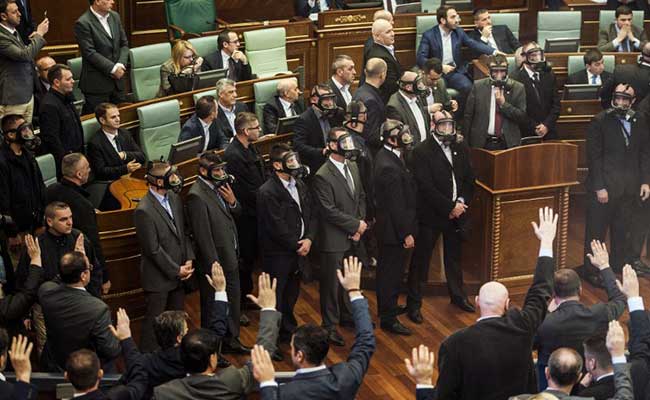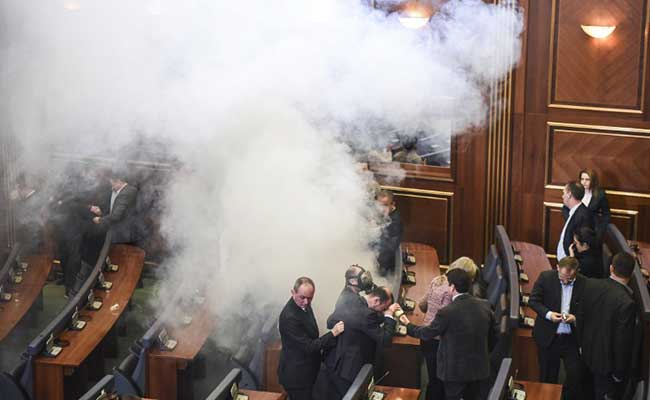
Kosovo police officers wearing gas masks inspect the parliament, after tear gas was launched by opposition lawmakers. (AFP Photo)
Pristina, Kosovo:
Opposition MPs in Kosovo disrupted the first parliamentary session of the year today with what has become their commonplace method of protest -- releasing tear gas in the chamber.
Angry about a government deal with Serbia and demanding snap elections, the united opposition has almost paralysed parliamentary proceedings since October with their tear gas protests.
"The people have turned their backs on the regime and the government must resign and respond to the people's will," Visar Ymeri, head of the Self-Determination party, told lawmakers before the session began and the first gas canister was opened.
The session was suspended after deputies began to flee during a hurried vote -- despite calls from the parliamentary speaker, also donning a gas mask, for them to continue with proceedings.
Two attempts to restart the session failed as they came up against more tear gas and 18 lawmakers were banned from the chamber, four of them forcibly removed by police.
Proceedings resumed mid-afternoon without the banned lawmakers, seven of whom were arrested.
The opposition is against a deal with Belgrade, backed by the European Union, to create an association giving greater powers to Kosovo's Serb minority.
It fears the plan will deepen Kosovo's ethnic divisions and increase the influence of Serbia, which does not recognise Kosovo's sovereignty.
 The opposition also opposes a border demarcation agreement with neighbouring Montenegro.
The opposition also opposes a border demarcation agreement with neighbouring Montenegro.
Protesters who have taken to the streets in recent months further accuse the authorities of widespread corruption, lagging development and a disregard for Muslim-majority Kosovo's 1.8 million people.
'Ugly Behaviour'
Several hundred opposition supporters gathered on Friday outside the parliamentary building in Pristina, sealed off by special riot police units, and chanted: "Down with the government".
"The only solution we accept now is elections, free elections," Self-Determination activist Yll Hoxha told the crowd.
The protesters, who later dispersed, also spoke against Foreign Minister and Deputy Prime Minister Hashim Thaci becoming president this year, a post for which he is currently the frontrunner.
Thaci himself described the chaotic scenes inside as "a continuation of the primitive and ugly behaviour" of the opposition.
US Ambassador to Kosovo Greg Delawie said the protesting deputies were "depriving the citizens of Kosovo of the right to live peacefully in an independent, democratic country and I deplore that".
 Friday marked the seventh tear gas protest by lawmakers, who have also thrown eggs, fired pepper spray and blown whistles in parliament in recent months.
Friday marked the seventh tear gas protest by lawmakers, who have also thrown eggs, fired pepper spray and blown whistles in parliament in recent months.
Ramush Haradinaj, leader of the Alliance for the Future of Kosovo opposition party, resigned later in the day, saying tear gas had been "the only path forward" against the "extreme irresponsibility" of those in power.
Thousands of protesters marched peacefully through Pristina on Wednesday, the eighth anniversary of Kosovo's independence from Serbia, calling for the government's resignation and new elections.
Kosovo's pro-independence ethnic Albanian rebels fought a war against Serb forces in the late 1990s, which ended after a NATO bombing campaign against Serbia.
The deal between Pristina and Belgrade was reached during EU-mediated talks to "normalise" relations.
Angry about a government deal with Serbia and demanding snap elections, the united opposition has almost paralysed parliamentary proceedings since October with their tear gas protests.
"The people have turned their backs on the regime and the government must resign and respond to the people's will," Visar Ymeri, head of the Self-Determination party, told lawmakers before the session began and the first gas canister was opened.
The session was suspended after deputies began to flee during a hurried vote -- despite calls from the parliamentary speaker, also donning a gas mask, for them to continue with proceedings.
Two attempts to restart the session failed as they came up against more tear gas and 18 lawmakers were banned from the chamber, four of them forcibly removed by police.
Proceedings resumed mid-afternoon without the banned lawmakers, seven of whom were arrested.
The opposition is against a deal with Belgrade, backed by the European Union, to create an association giving greater powers to Kosovo's Serb minority.
It fears the plan will deepen Kosovo's ethnic divisions and increase the influence of Serbia, which does not recognise Kosovo's sovereignty.

Angry over a government deal with Serbia and demanding snap elections, the united opposition has effectively blocked parliamentary proceedings with their tear gas protests. (AFP Photo)
Protesters who have taken to the streets in recent months further accuse the authorities of widespread corruption, lagging development and a disregard for Muslim-majority Kosovo's 1.8 million people.
'Ugly Behaviour'
Several hundred opposition supporters gathered on Friday outside the parliamentary building in Pristina, sealed off by special riot police units, and chanted: "Down with the government".
"The only solution we accept now is elections, free elections," Self-Determination activist Yll Hoxha told the crowd.
The protesters, who later dispersed, also spoke against Foreign Minister and Deputy Prime Minister Hashim Thaci becoming president this year, a post for which he is currently the frontrunner.
Thaci himself described the chaotic scenes inside as "a continuation of the primitive and ugly behaviour" of the opposition.
US Ambassador to Kosovo Greg Delawie said the protesting deputies were "depriving the citizens of Kosovo of the right to live peacefully in an independent, democratic country and I deplore that".

The united opposition has effectively blocked parliamentary proceedings since October with their tear gas protests. (AFP Photo)
Ramush Haradinaj, leader of the Alliance for the Future of Kosovo opposition party, resigned later in the day, saying tear gas had been "the only path forward" against the "extreme irresponsibility" of those in power.
Thousands of protesters marched peacefully through Pristina on Wednesday, the eighth anniversary of Kosovo's independence from Serbia, calling for the government's resignation and new elections.
Kosovo's pro-independence ethnic Albanian rebels fought a war against Serb forces in the late 1990s, which ended after a NATO bombing campaign against Serbia.
The deal between Pristina and Belgrade was reached during EU-mediated talks to "normalise" relations.
Track Latest News Live on NDTV.com and get news updates from India and around the world

